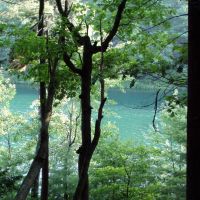Climate Change Hits Walden Pond
 Walden Pond (photo: Walden Pond State Reservation)
Walden Pond (photo: Walden Pond State Reservation)
While spending two years observing the natural setting of Walden Pond, Henry David Thoreau remarked: “Live in each season as it passes; breathe the air, drink the drink, taste the fruit, and resign yourself to the influence of the earth.”
More than 150 years later, life around Walden Pond is still revealing nature’s influence, particularly that of climate change.
These days, the trees and shrubs surrounding the famed Massachusetts lake are producing leaves 18 days earlier during the spring than when Thoreau made his observation in the 1840s, according to biologists at Boston University who compared Thoreau’s unpublished notes on leaf-out times with five recent springs.
The five-year study revealed that warmer temperatures produced by climate change are causing plants to behave differently, and in a way that may jeopardize their survival.
“By comparing historical observations with current experiments, we see that climate change is creating a whole new risk for the native plants in Concord,” Professor Richard Primack wrote in the New Phytologist. “Weather in New England is unpredictable, and if plants leaf out early in warm years, they risk having their leaves damaged by a surprise frost. But if plants wait to leaf out until after all chance of frost is lost, they may lose their competitive advantage.”
Primack and his colleagues found not all plants around Walden are responding in the same way to global warming.
Non-native shrubs, like the Japanese barberry, can produce leaves earlier than normal, such as during an unusual spell of warm weather, and still survive if temperatures again plummet—putting them in a position to remain and thrive, even while native plants succumb to sudden fluctuations in temperature.
“Our current observations show that plants in Concord today are leafing out earlier than in Thoreau’s time in response to warm temperatures,” Amanda Gallinat, a second-year graduate student and coauthor of the paper, said. “However, the experiments show that as spring weather continues to warm, it will be the invasive shrubs that will be best able to take advantage of the changing conditions.”
-Noel Brinkerhoff
To Learn More:
Walden Trees Leafing Out Far Earlier Than in Thoreau’s Time (by C. Polgar, A. Gallinat, and R.B. Primack, New Phytologist)
Thoreau’s Walden Pond Warms Up (by Tim Radford, Climate News Network)
- Top Stories
- Unusual News
- Where is the Money Going?
- Controversies
- U.S. and the World
- Appointments and Resignations
- Latest News
- Trump Renames National Football League National Trump League
- Trump to Stop Deportations If…
- Trump Denounces World Series
- What If China Invaded the United States?
- Donald Trump Has a Mental Health Problem and It Has a Name






Comments